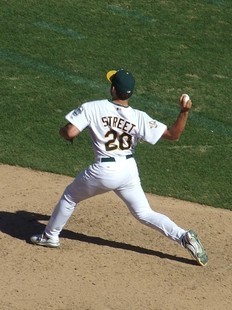Be a PM Closer
 I love baseball. I love watching the strategies, the big plays, the colossal errors (anyone remember poor Bill Buckner?) and the dramatic finishes. The Tampa Bay Rays, who in nine of their first ten years of existence finished dead last in their division (In 2004 they managed to beat out one team and finished fourth in their division), surprised everyone in 2008 by beating out such teams as the Boston Red Sox and the New York Yankees and made it to the World Series only to lose to the Philadelphia Phillies. Even though they lost the World Series, they were heroes in the eyes of millions who rooted for them and their storybook season.
I love baseball. I love watching the strategies, the big plays, the colossal errors (anyone remember poor Bill Buckner?) and the dramatic finishes. The Tampa Bay Rays, who in nine of their first ten years of existence finished dead last in their division (In 2004 they managed to beat out one team and finished fourth in their division), surprised everyone in 2008 by beating out such teams as the Boston Red Sox and the New York Yankees and made it to the World Series only to lose to the Philadelphia Phillies. Even though they lost the World Series, they were heroes in the eyes of millions who rooted for them and their storybook season. One strategy that I particularly enjoy is the use of specialty players, of which the most prevalent is the "closer". The closer is a pitcher who is brought in for just a very short period of the game (typically the last inning of a game) to shut down opponent hitters and either secure a win for their team or allow a team who is behind to catch up in their last at-bat.
I can remember as a kid watching Sparky Lyle of the New York Yankees and Tug McGraw of the New York Mets craft the role of the closer to an art form and save game after game through their ability to perform under pressure.
They're most always used in high-pressure situations where the fate of the game rests in large part on their shoulders. Baseball teams pay big bucks for top-notch closers not because they can play in a lot of innings, but because they can seal the deal and handle the pressure when the game is on the line.
Amazon.com Widgets Throughout my years I've come to appreciate the importance of the closer in baseball, but have also drawn an important parallel between a closer and what we do as project managers. Time after time many project managers will start out of the blocks full of excitement and passion about their project. Then along the way things start going wrong, whether it be unanticipated schedule or budget issues, an unforeseen risk spinning out of control, or an ugly issue rearing its head. Rather than act deliberately, many PM's will sweep the problem under the rug, start screaming "fire", panic, or politically disengage themselves from the problem by blaming someone else. In any event, rather than act to address the problem the PM does nothing to help the situation and most likely does things to further exacerbate the problem. If management is attentive to the problem then a likely outcome is to replace the project manager with a "closer"; a more experienced and seasoned PM who can stare down a problem and get things under control. Closers are worth their weight in gold to an at-risk project.
Earlier in my career I wasn't a closer. I was the arrogant one who started out of the blocks thinking I was all that and a bag of chips, then would get replaced when I bungled things up. I had to learn to be a closer, and after doing this stuff for 25 years I am still a student of the craft. What I've learned about being a closer is that a closer has to be able to do the following:
Know the rules and rudiments of project management cold Know how the rules can be bent or broken when necessary to keep a project on track Have a natural curiosity to understand why something works, or doesn't work Be realistic in what can and can't be done Listen to a wide variety of perspectives and be able to draw concise and coherent conclusions from those perspectives Clearly articulate root-cause problems and lay out a path for getting the project out of trouble Understand how to communicate concisely and ensure his or her message gets across to recipients clearly Be politically aware of what's going on in the project and the stakeholder organizations, but not be driven by the politics Be calm and focused when everyone else is panicking
I am a firm believer that being a closer requires experience; it is very unlikely (though not impossible) that a novice PM can be a closer. At the same time, having years of experience doesn't automatically anoint you as a closer. I've seen many PM's with years of experience crash and burn when a project started going sideways.
My one nugget to you is this: know what it means to be a closer and fill the skill gaps necessary to serve in the role effectively. Use your manager, your peers and your team members to help articulate what a prototypical closer looks like in your organization then lay out a clear path to nailing those skills down.
Published on January 24, 2014 07:24
No comments have been added yet.



